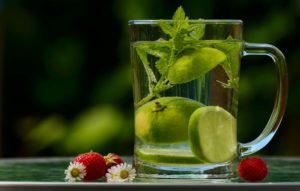In collaboration with Liver4Life
Your liver has probably been at the centre of all the excitement and celebrations of the holiday season. It has been working silently and efficiently, filtering any alcohol consumed and processing any rich, fatty foods eaten. Now that January has arrived, you may feel compelled to set your New Year’s resolution, prioritising your health.
Often, the liver can be a focus for people who want to give their liver a break and help regenerate its cells. By establishing healthy habits in January, it can really help you maintain good health throughout the year. On average, it takes more than two months before a new behaviour becomes automatic so expect your resolutions to be second-nature by mid-March!1,2
®PixaBay Pexels
Hydration
Your body needs water or other fluids to work properly and to avoid dehydration. That’s why it’s important to drink enough fluids. In climates such as European areas, we should drink about 1.2 litres (six to eight glasses) of fluid every day to stop us getting dehydrated.3
Water is a healthy and cheap choice for quenching your thirst at any time. It has no calories and contains no sugars that can damage teeth. Tea and coffee (without added sugar) can also be healthy too.
A number of recent studies have highlighted the benefits of coffee to the liver. For example, research published in the Journal of Hepatology in 2016, studied the preventive benefits of tea and coffee to the liver.4 A team of scientists examined the data available on 2,424 participants from a large cohort study called the Rotterdam Study. The study revealed that frequent coffee and herbal tea consumption consistently correlated with a significantly lower risk of liver stiffness.4 These results were independent of lifestyle factors or BMI.
Additionally, the researchers found that the beneficial effect of coffee on liver stiffness could be seen both in participants who had a fatty liver and those who did not. This indicated to the authors that frequent coffee and tea intake may prevent liver fibrosis long before the signs of liver disease start to appear.4
Exercise to eliminate carbohydrates
The liver also dictates energy levels, so if you were looking to join the gym, it would be wise to concentrate on optimising its function. We all know we need carbohydrates for energy however most people probably don’t realise that the liver manages the release of this vital energy source.
Once carbohydrates have been broken down into glucose in your gastrointestinal tract, the glucose enters the blood stream and is taken straight to your liver to regulate and maintain healthy levels. Your liver also stores excess glucose in the form of glycogen, ready for converting back into glucose when levels drop between meals, during exercise or when you’re fasting.5
In summary, your liver is your body’s factory, filtering all the blood in the body, removing toxins and generating the energy you need to function. By taking care of your liver you will be well on the way to feeling better overall.
Some key points to consider when optimising your liver function and establishing great habits for this new year that will benefit your liver and your health overall:
- Stay hydrated, try to drink a minimum of 1.2 litres a day of water or other healthy fluids
- Eat well – consume lots of green, leafy vegetables and minimise processed foods
- Consider your liver when planning your next gym session – ensure it is properly fuelled so it can optimise your body’s overall performance
- Add a cup or two of tea or coffee in to your daily routine
- Avoid alcohol and other toxins that could take up your liver’s processing time. It could be doing other jobs that ensure you remain in top health!
If you are worried about your liver function or the health of your liver, visit your GP.
References
- Huffington Post. How Long Does It Actually Take to Form a New Habit? (Backed by Science). https://www.huffingtonpost.com/james-clear/forming-new-habits_b_5104807.html [Accessed January 2018]
- Lally, P., van Jaarsveld, C. H. M., Potts, H. W. W. and Wardle, J. (2010), How are habits formed: Modelling habit formation in the real world. Eur. J. Soc. Psychol., 40: 998–1009. doi:10.1002/ejsp.674
- NHS Choices. Binge drinking. https://www.nhs.uk/Livewell/Goodfood/Pages/water-drinks.aspx [Accessed January 2018]
- Medical News Today. Drinking coffee and tea may prevent liver disease https://www.medicalnewstoday.com/articles/317827.php [Accessed January 2018]
- Love Your Liver – Australia. http://loveyourliver.com.au/why-is-it-important/ [Accessed January 2018]

